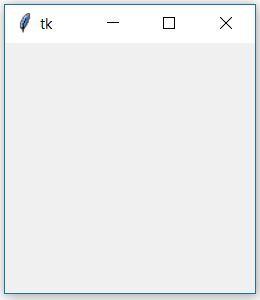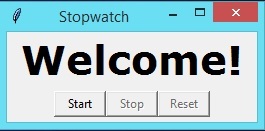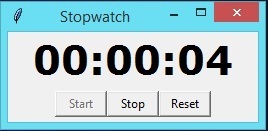使用Python创建秒表
本文重点介绍在Python中使用Tkinter创建秒表
Tkinter :Tkinter 是Python的标准 GUI 库。 Python与 Tkinter 结合使用提供了一种快速简便的方式来创建 GUI 应用程序。 Tkinter 为 Tk GUI 工具包提供了一个强大的面向对象接口。开始使用 Tkinter 非常容易,这里有一些示例代码可以让您在Python中使用 Tkinter。
Python3
# Python program to create a
# a new window using Tkinter
# importing the required libraries
import tkinter
# creating a object 'top' as instance of class Tk
top = tkinter.Tk()
# This will start the blank window
top.mainloop()Python3
# Python program to illustrate a stop watch
# using Tkinter
#importing the required libraries
import tkinter as Tkinter
from datetime import datetime
counter = 66600
running = False
def counter_label(label):
def count():
if running:
global counter
# To manage the initial delay.
if counter==66600:
display="Starting..."
else:
tt = datetime.fromtimestamp(counter)
string = tt.strftime("%H:%M:%S")
display=string
label['text']=display # Or label.config(text=display)
# label.after(arg1, arg2) delays by
# first argument given in milliseconds
# and then calls the function given as second argument.
# Generally like here we need to call the
# function in which it is present repeatedly.
# Delays by 1000ms=1 seconds and call count again.
label.after(1000, count)
counter += 1
# Triggering the start of the counter.
count()
# start function of the stopwatch
def Start(label):
global running
running=True
counter_label(label)
start['state']='disabled'
stop['state']='normal'
reset['state']='normal'
# Stop function of the stopwatch
def Stop():
global running
start['state']='normal'
stop['state']='disabled'
reset['state']='normal'
running = False
# Reset function of the stopwatch
def Reset(label):
global counter
counter=66600
# If rest is pressed after pressing stop.
if running==False:
reset['state']='disabled'
label['text']='Welcome!'
# If reset is pressed while the stopwatch is running.
else:
label['text']='Starting...'
root = Tkinter.Tk()
root.title("Stopwatch")
# Fixing the window size.
root.minsize(width=250, height=70)
label = Tkinter.Label(root, text="Welcome!", fg="black", font="Verdana 30 bold")
label.pack()
f = Tkinter.Frame(root)
start = Tkinter.Button(f, text='Start', width=6, command=lambda:Start(label))
stop = Tkinter.Button(f, text='Stop',width=6,state='disabled', command=Stop)
reset = Tkinter.Button(f, text='Reset',width=6, state='disabled', command=lambda:Reset(label))
f.pack(anchor = 'center',pady=5)
start.pack(side="left")
stop.pack(side ="left")
reset.pack(side="left")
root.mainloop()输出:

使用 Tkinter 创建秒表
现在让我们尝试使用 Tkinter 模块创建一个程序来创建秒表。
秒表是一种手持式时计,旨在测量从特定时间启动到停止时所经过的时间量。为远距离观看而设计的大型数字版秒表,例如在体育场内,称为秒表。在手动计时中,时钟由一个人按下按钮来启动和停止。在全自动时间,启动和停止都是由传感器自动触发的。
所需模块:我们将仅使用 Tkinter 来创建 GUI,此程序中不会使用其他库。
源代码:
Python3
# Python program to illustrate a stop watch
# using Tkinter
#importing the required libraries
import tkinter as Tkinter
from datetime import datetime
counter = 66600
running = False
def counter_label(label):
def count():
if running:
global counter
# To manage the initial delay.
if counter==66600:
display="Starting..."
else:
tt = datetime.fromtimestamp(counter)
string = tt.strftime("%H:%M:%S")
display=string
label['text']=display # Or label.config(text=display)
# label.after(arg1, arg2) delays by
# first argument given in milliseconds
# and then calls the function given as second argument.
# Generally like here we need to call the
# function in which it is present repeatedly.
# Delays by 1000ms=1 seconds and call count again.
label.after(1000, count)
counter += 1
# Triggering the start of the counter.
count()
# start function of the stopwatch
def Start(label):
global running
running=True
counter_label(label)
start['state']='disabled'
stop['state']='normal'
reset['state']='normal'
# Stop function of the stopwatch
def Stop():
global running
start['state']='normal'
stop['state']='disabled'
reset['state']='normal'
running = False
# Reset function of the stopwatch
def Reset(label):
global counter
counter=66600
# If rest is pressed after pressing stop.
if running==False:
reset['state']='disabled'
label['text']='Welcome!'
# If reset is pressed while the stopwatch is running.
else:
label['text']='Starting...'
root = Tkinter.Tk()
root.title("Stopwatch")
# Fixing the window size.
root.minsize(width=250, height=70)
label = Tkinter.Label(root, text="Welcome!", fg="black", font="Verdana 30 bold")
label.pack()
f = Tkinter.Frame(root)
start = Tkinter.Button(f, text='Start', width=6, command=lambda:Start(label))
stop = Tkinter.Button(f, text='Stop',width=6,state='disabled', command=Stop)
reset = Tkinter.Button(f, text='Reset',width=6, state='disabled', command=lambda:Reset(label))
f.pack(anchor = 'center',pady=5)
start.pack(side="left")
stop.pack(side ="left")
reset.pack(side="left")
root.mainloop()
输出:

